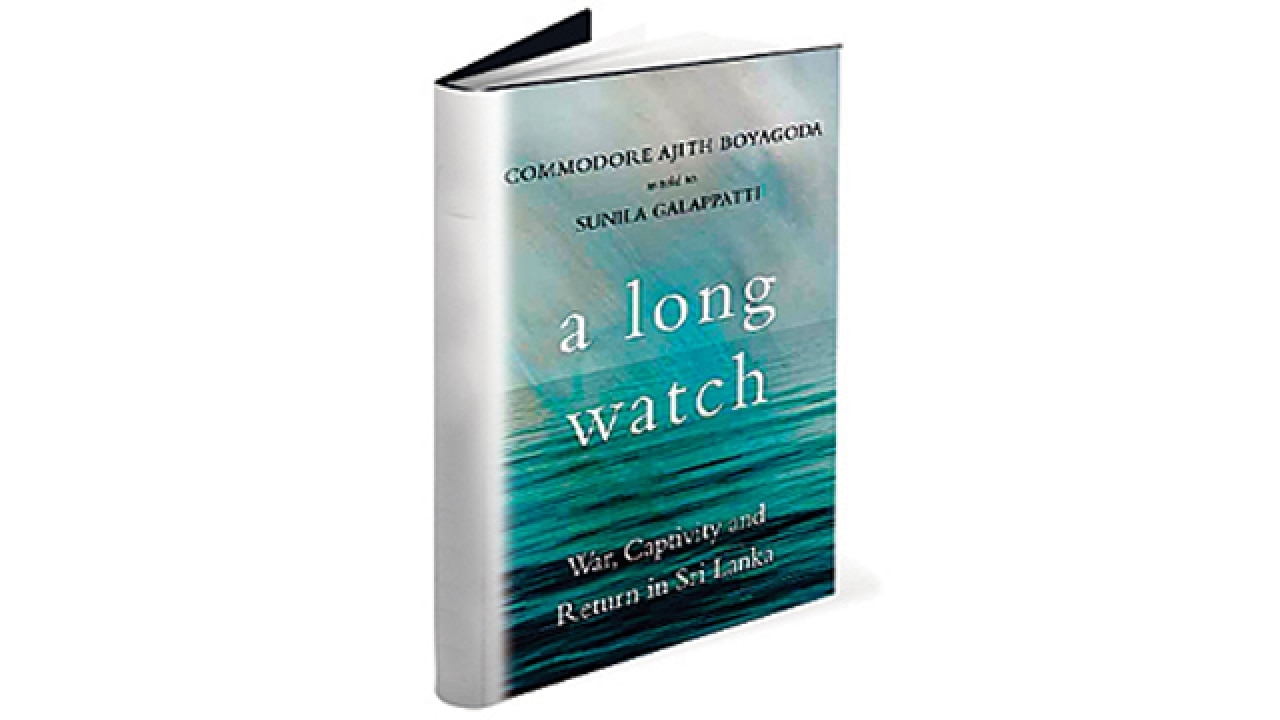
In the seven years since the Liberation Tigers of Tamil Eelam (LTTE) were vanquished, some excellent works of non-fiction have emerged out of Sri Lanka telling the stories of people on both sides of the civil war whose lives were destroyed or disrupted. Commodore Ajith Boyagoda's A Long Watch: War, Captivity and Return in Sri Lanka is the story of a soldier, held prisoner of war for eight years by the Tamil Tigers, first as a trophy catch to parade before their compatriots and international media, and later as a bargaining chip to secure the release of jailed rebels. In the eight years he spent in captivity, Boyagoda not just faced loss of freedom, he missed out on his children's growing up years and his career never recovered from the ignominy of losing his ship and the insinuations of professional incompetency.
My initial circumspection about reading a Sinhala ranking soldier's memoir gave way to surprise and finally heartfelt appreciation for a man who unwaveringly appealed to the humanitarian instincts of his captors, and on most occasions, met with success. In Boyagoda's eyes, the "dreaded" Tamil Tigers morphed into ordinary people caught in a cruel war that none of them were responsible for triggering or could escape. Boyagoda's narrative is commendable because it eschews the majoritarian bias that vitiated the island nation's politics, society and vital institutions, the armed forces and media.
In 1994, with two decades of service in the Navy, Boyagoda was commandeering the SLNS Sagarawardene, which was patrolling the north-eastern coast along the Gulf of Mannar when a suicide boat ploughed into it. An ambush by gunboats belonging to the LTTE's naval wing ensued, but with the ship sinking and many of his crew already drowned, Boyagoda was the last to leave the Sagarawardene and captured by the Tigers after drifting in a raft for over half an hour.
When captured in 1994, Boyagoda claims he was spared harsh, and perhaps even capital punishment because the Tigers were aware of his exemplary conduct as a naval officer. Placed in charge of Karainagar island after the Sri Lankan army invaded it in 1991, he ensured that the Tamil inhabitants of the island were treated with dignity and compassion. As Boyagoda was passed on from one jailor to the next, the treatment he received would oscillate wildly from compassion to hostility. Boyagoda sought to understand the human instincts and the dehumanising experiences that triggered such behaviour among his jailors. He learned to make the best of the circumstances for himself and fellow prisoners of war, who deferred more to his dignified acceptance of his situation, rather than his rank and erstwhile station in life.
The perversities of prison life did come to haunt Boyagoda. He was perpetually in chains, which were removed only during the monthly visit to the Red Cross office. From giving out orders while commanding a naval ship, Boyagoda was reduced to taking permission to use the rudimentary bathroom and toilet facilities he shared with fellow prisoners. Later, after release, he writes of moments when he would wait before undertaking even the most routine of tasks, because he had become habituated to taking orders. The Tigers were not averse to testing Boyagoda's resolve. Freedom was only a nod away, but Boyagoda would have to turn traitor and offer tacit support to the LTTE in Colombo; a bait he steadfastly refused.
However, Boyagoda did end up embarrassing his government when he joined a hunger fast initiated by fellow prisoners who were fast running out of patience over Colombo's failure to secure their release. Boyagoda was finally freed in 2002 in a prisoner swap, but rehabilitation was not smooth. It took him years to regain his children's confidence, but the harder fight was to convince the establishment that the sinking of the ship was not an error at his end. A court martial finally pronounced him innocent. Boyagoda's lack of acrimony for his captors perhaps reflects a soldier's acceptance of the risks of his job. With a narrative that highlights Boyagoda's ability to surmount the identity politics that scarred Sri Lanka's past, one hopes that the book becomes a metaphor for a new dawn in Sri Lanka where Sinhalese, Tamil and Muslim communities will embrace their differences and break out of the islands of exclusion that prevent each from experiencing the other's humanity.